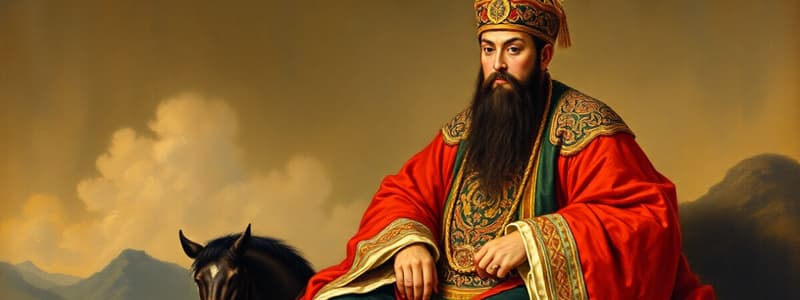Podcast
Questions and Answers
What skills did the Mongols develop that were essential for their nomadic lifestyle?
What skills did the Mongols develop that were essential for their nomadic lifestyle?
The Mongols developed horse riding and fighting skills.
What major change did Genghis Khan implement to unify the Mongol clans?
What major change did Genghis Khan implement to unify the Mongol clans?
Genghis Khan created a new law code and formed a group of clan chiefs.
How did the Mongols encourage economic and cultural interactions between Asia and Europe?
How did the Mongols encourage economic and cultural interactions between Asia and Europe?
The Mongols encouraged trade and taxed products.
What was the significance of the Yuan Dynasty established by Kublai Khan?
What was the significance of the Yuan Dynasty established by Kublai Khan?
What was unique about the governance structure under the Yuan dynasty?
What was unique about the governance structure under the Yuan dynasty?
How did Marco Polo contribute to the understanding of Mongol China?
How did Marco Polo contribute to the understanding of Mongol China?
What was the role of Quanzhou during the Yuan dynasty?
What was the role of Quanzhou during the Yuan dynasty?
What impact did Mongol rule have on the Chinese populace?
What impact did Mongol rule have on the Chinese populace?
Flashcards
What skills did the Mongols develop for their nomadic lifestyle?
What skills did the Mongols develop for their nomadic lifestyle?
The Mongols, originally nomadic people from the steppes of Central Asia, developed skills like horseback riding and fighting, which allowed them to conquer vast territories and build a powerful empire.
How did Genghis Khan unify the Mongol clans?
How did Genghis Khan unify the Mongol clans?
Genghis Khan united the Mongol clans by creating a new law code, establishing a system of governance, and uniting them under his leadership.
What was the impact of Mongol conquests on the lands they conquered?
What was the impact of Mongol conquests on the lands they conquered?
The Mongol conquest brought both destruction and stability to the lands they conquered. While they brought violence and disruption, they also fostered trade and cultural exchange between Asia and Europe.
Who established the Yuan Dynasty in China?
Who established the Yuan Dynasty in China?
Signup and view all the flashcards
How did the Mongols maintain their own identity during the Yuan Dynasty in China?
How did the Mongols maintain their own identity during the Yuan Dynasty in China?
Signup and view all the flashcards
What were the main outcomes of Yuan Dynasty rule in China?
What were the main outcomes of Yuan Dynasty rule in China?
Signup and view all the flashcards
What role did Quanzhou play during the Yuan dynasty?
What role did Quanzhou play during the Yuan dynasty?
Signup and view all the flashcards
How did the Mongols rule Korea differently from China?
How did the Mongols rule Korea differently from China?
Signup and view all the flashcards
Study Notes
Mongol Expansion
- Nomadic lifestyle skills developed by Mongols included horsemanship and fighting.
- Genghis Khan unified Mongol clans, establishing a new law code and a group of clan leaders.
- Conquests of steppe clans and major civilizations provided new recruits and tribute.
- After Genghis Khan's death, the empire was divided into Khanates, with Kublai Khan focusing on controlling China.
- Mongol rule brought both destruction and stability, encouraging trade and cultural exchange between Asia and Europe, and imposing taxes.
- Mongols were tolerant of different cultures and religions, even adopting some aspects like gunpowder technology.
Mongol Conquest of China
- Kublai Khan established his capital in Khanbaliq (modern Beijing).
- The Mongol conquest of China ended the Song Dynasty and established the Yuan Dynasty.
- Top leadership positions were given to Mongols.
- Distinct Mongol language, laws, and customs created a divide from the Chinese culture.
- The Yuan dynasty did not use traditional Chinese civil service examinations for government positions.
- Government jobs were open to non-Chinese individuals.
- Buddhism was a prominent religion among the Mongols.
- The Mongol rule saw a period of prosperity and wealth in China, gaining support from the population.
- Marco Polo, a Venetian, lived in Khanbaliq during Kublai Khan's reign, gathering information for his trips.
- The Yuan dynasty invested in shipbuilding and expanded maritime trade, with discoveries and knowledge shared with other regions (Muslims and Europeans).
- Mongol armies conquered Vietnam and Korea, with Korean officials remaining in place under Mongol control, but forced to build ships for the Mongols.
- Quanzhou, a Southeast China port city, served as a major trading hub with significant foreign presence (Arab, Persian, Indian, European merchants).
Studying That Suits You
Use AI to generate personalized quizzes and flashcards to suit your learning preferences.




